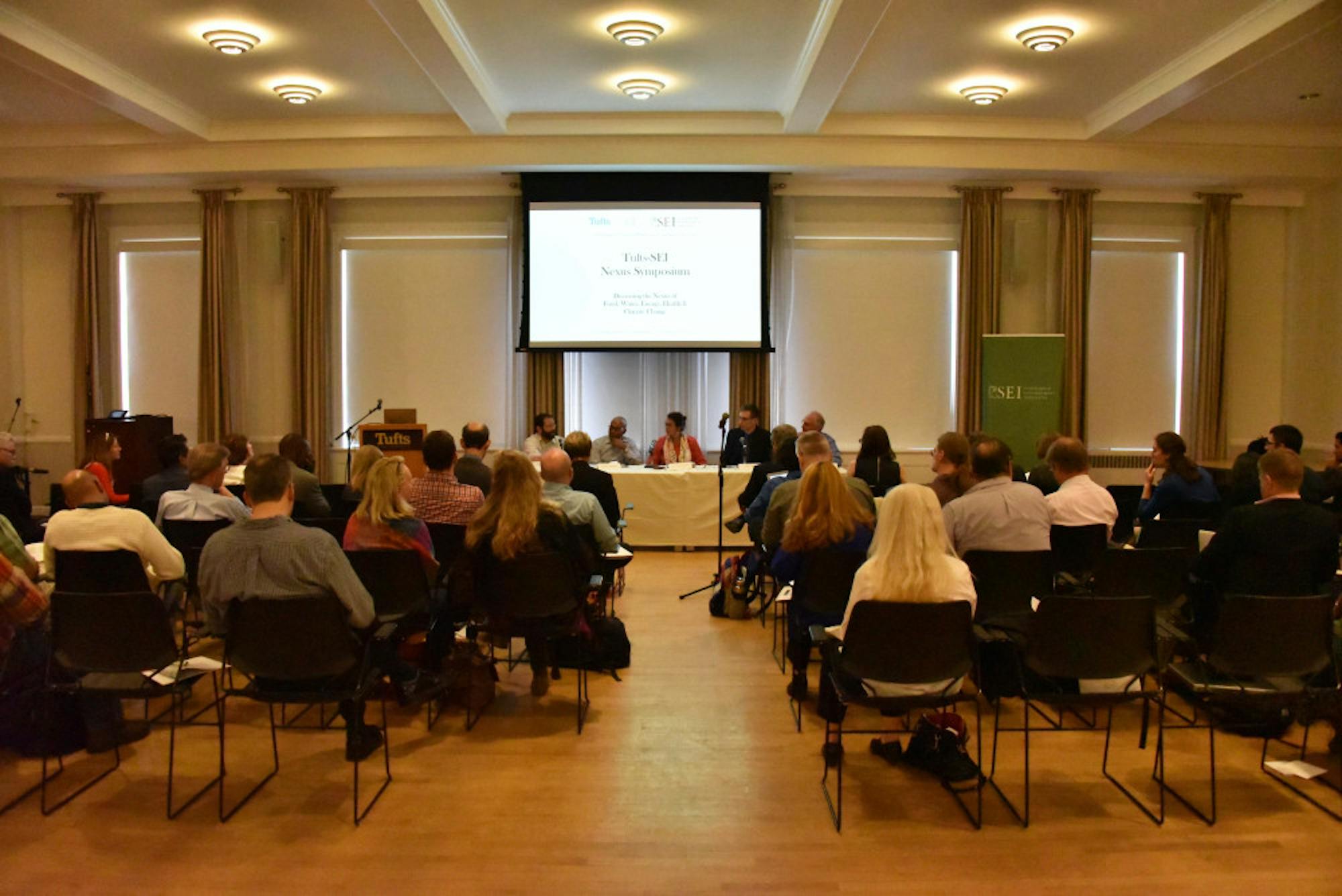Students, faculty and researchers explored the intersections of energy, food, health and climate science at the Tufts-Stockholm Environment Institute (SEI) Nexus Symposium yesterday. The symposium commemorated 10 years of collaboration between SEI and the Tufts Institute of the Environment (TIE).
The event began with remarks by University President Anthony Monaco, TIE Director and Professor of Civil and Environmental Engineering Linda Abriola and SEI Senior Scientist Annette Huber-Lee. Then, a panel of professors and researchers gave their outlook on the future of energy policy from economic and technological perspectives in a discussion moderated by Professor Emeritus of International Environmental Policy William Moomaw.
Moomaw framed the panel partially in the context of the Paris Agreement, a global agreement that aims to limit future increases in the world's temperature. Panelists worried that the election of President Donald Trump would slow the United States' momentum on carbon reduction in the short run, but several panelists saw the efforts of other countries as reasons for optimism.
Rob Bailis, a senior scientist at SEI, discussed the continued prevalence of traditional energy sources such as wood fuel in the developing world. He pointed out that because users of traditional energy need to gather their own fuel, the transition away from those energy sources causes people to become less aware of the impact of their energy consumption.
"The more we advance in terms of the energy that we utilize, it becomes less and less visible to us," Bailis said. "We forget about the implications of it. We forget about where it comes from."
Professor of Economics Ujjayant Chakravorty spoke about the implications of rising energy consumption in China and India. He said it is beneficial for people to have access to electricity in their homes but that the source of that energy is a crucial question. However, he is optimistic that both China and India have shown a real commitment to sustainability.
"There is some hope that many of these countries will have a large political will [to control carbon emissions], even though the United States might go back," Chakravorty said.
Kelly Sims Gallagher, professor of energy and environmental policy at the Fletcher School of Law and Diplomacy, cited several indications that both developing and developed countries are implementing policies to mitigate and adapt to climate change. In particular, she noted that these countries are interested in financing policies, carbon pricing strategies and research and development investments.
SEI Senior Scientist Jason Veysey shared some of Gallagher's optimism and pointed out that political will is still strong in many other countries. He cited Morocco, which has set an ambitious goal to increase renewable energy consumption, and the Philippines, which is also looking to reduce its fossil fuel reliance due to the cost of importing fuel.
After their introductory remarks, the panelists discussed progress to limit global temperature increases to below 1.5 degrees Celsius, which is one of the Paris Agreement's goals. All four panelists were doubtful that this is feasible, but they expressed varying degrees of optimism. Bailis saw it as unlikely in the next few years because there is not enough will to make the necessary changes. Chakravorty, meanwhile, saw both positive and negative indicators worldwide in the long run.
Gallagher acknowledged that Trump's election has stemmed much of the United States' momentum on climate change mitigation, but she said that China and other countries are still working in spite of that. Similarly, Veysey said that the 1.5-degree target is not likely unless negative emissions technologies become practical but that temperature increases could stabilize above 2 degrees.
"I do think, if all the other countries decide to stay the course and just ... wait the United States out for four years, [the momentum] isn't necessarily lost," Gallagher said. "I think, if this lasts more than four years, we're really going to have trouble."
In addition, Moomaw noted that many sub-national governments, such as cities worldwide and American states, still support reductions in carbon emissions. He said that even though commitments by local governments and corporations are non-binding, they can have a cumulative impact.
Likewise, Gallagher said that some states are looking to make up for the loss of leadership at the federal level and that private-sector strategic investments are promising. Veysey said that market forces also have a role and that Trump cannot subvert the market-driven decrease in coal consumption.
Finally, the panelists talked about how to support adaptation and mitigation investments in the developing world, as the United States is likely to roll back foreign aid. Bailis said that the gap in infrastructure investments left by the United States could be filled partially by the private sector and by China, considering that China has increased its investments in the developing world as a whole.
Chakravorty expressed hope that the private sector will invest in infrastructure and technology, and he said that liberalization and government incentives can help encourage this. Gallagher agreed that incentives should be offered, explaining that she never expected that all of the financing needed for climate mitigation and adaptation would come from the public sector alone.
Veysey pointed out that it is difficult to build renewable energy capacity in the developing world and that researchers can help to mitigate this.
"I think that there's a real dearth of knowledge about what constitutes the most effective capacity-building techniques in the climate-energy area," he said.
After the first panel, the symposium featured keynote speeches by Professor of Civil and Environmental Engineering Steven Chapra and SEI Executive Director Johan Kuylenstierna as well as a panel about food, water and health.
Academics discuss environmental policy, research at Nexus Symposium

The Stockholm Environment Institute (SEI) and the Tufts Institute of the Environment (TIE) held an anniversary symposium to commemorate the dedicated cooperation between Tufts and SEI in Alumnae lounge on April 11.





